It’s that time of year, Silicon Valley’s investor technocrati and advice-giving Twitter celebrities descended upon Pier 48 in San Francisco to judge the latest summer batch of Y Combinator startups. TechCrunch was there, as well, and we were tapping away feverishly as co-founders pitched to woo investors.
There are 197 companies in total in the summer YC batch, we heard from 84 of them today — in addition to a few off-the-record pitches which we agreed to hold off publicizing as they remain in stealth. We’ll hear from another chunk of them tomorrow, so check back tomorrow for even more startup blurbs.
Demo Day used to be the debut for many of these companies, but as Y Combinator’s prestige has grown so has the likelihood that the batch’s best will be closing rounds at outsized valuations before the first pitches have been made.
We’ll undoubtedly be reporting on some of these rounds moving forward, but for now here are the 84 companies whose founders pitched onstage today at Y Combinator Demo Days – Day 1. You can also find the remaining 82 startups that pitched on Demo Day 2 here, as well as our 12 top picks from Day 2.
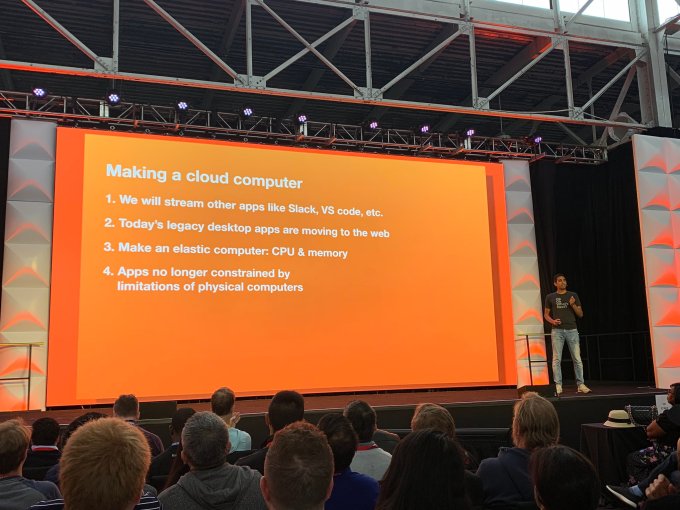
- Mighty: Mixpanel’s founder is at Y Combinator with his new startup, Mighty, a $20 per month cloud computer streaming service that’s just for Google Chrome (at the moment). Why pay for a free piece of software? The startup says that by streaming the experience from a beefed-up PC your most-used app will be considerably faster and only use 5% of your CPU. It’s a premium product with a tight niche, but the company has ambitions to support other software types as it builds out the tech.
- Hype and Vice: This startup combines the latest trends with college brands to make fashion-focused college apparel for women. Working with 11 universities to date, the founders say the company has grown 4x YoY, with margins of 84%; meanwhile, they have 50 additional college licenses in the pipeline.
- Lumineye: Lumineye wants to help first responders identify people through walls. In domestic violence disputes, hostage rescue or human trafficking situations, first responders often need help determining where humans are behind closed doors or other barriers. Lumineye’s team of four built a portable 3D-printed radar device that uses signal analysis software to differentiate moving and breathing humans from other objects through barriers like drywall, concrete, rubble and brick. For Lumineye, four pilot programs represent $90K in ARR. They’ve also just signed a $50K pilot with the U.S. Air Force. They’re also signed on to start testing with the FBI this fall.
- Flo Recruit: This is an applicant-tracking platform for in-person recruiting events. The startup helps companies scale their college recruiting efforts, saving time and money. The company says they have $8,500 in monthly recruiting revenue, counting Y Combinator itself as one of its customers.
- Gaiascope: Electricity trading is a $15 billion annual market, but it’s hard. Electricity is consumed instantly, which means the supply must always match the demand. That, however, leads to extreme price volatility. Traditional quant models don’t work, so this is where Gaiascope’s algorithms come in. Through its quant fund, Gaiascope enables electricity trading at more predictable prices.
- Revel: Many of the venture-backed communities online seem to be geared toward 20-something dudes, but Revel is aiming to create an online-to-offline community group for women over the age of 50. The site is a $15 per month membership that gives you access to the community-hosted groups. Revel went live in the Bay Area last month.

- Node: Node wants to use an Ikea-like assembly process to build sustainable backyard cottages — a market the founders say is worth $100 billion and growing quickly. In the past year 25 cities have passed legislation to allow these buildings. Node ships a flat pack of materials that it says only take a few days to assemble into a turnkey backyard cottage or sustainable vacation home. They’ve sold 11 homes in the past two weeks, and the founders are optimistic that they could reach 50% margins with their tech. Early target markets include Seattle, Portland and Vancouver.
- Prolific: A marketplace for finding survey participants on demand. Submit your survey, tell them a bit about your target audience, and they’ll find survey participants accordingly. They saw $185K net revenue in July, with 2.5x yearly growth through word of mouth.
- Juno College of Technology: JCT is creating the technical university of the future. The startup operates a coding bootcamp, expected to do $3 million in revenue by the end of 2019. Similar to Lamda School, they offer income-share agreements, but “the similarities stops there,” explained the founder. Juno says it places 87% of students who complete their nine-week long program.
- LAIKA: In Latin America, it’s hard to buy pet supplies in person due to a reliance on bus transportation. LAIKA, an online pet supplies service for Latin America, aims to make it easier. The startup has $200,000 in monthly revenues and is growing 30% month over month.
- ScholarMe: The startup is building what it calls the “Common App for college financing,” a single form that helps students pay for college. The company prevents prospective students from filling out endless forms to find scholarships, FAFSAs, income-share agreements and loans.
- Sable: Getting set up with a bank is a slow process for people new to the U.S. It can take months for foreign-born people to get set up with a credit card and a checking account. Sable launched a mobile bank for international people in the U.S. that wants to expedite that process. The team has collectively worked on distributed teams that launched 14 banking products in the past. The company is currently managing credit cards and live checking accounts. With Sable, users can get set up with a credit card and checking account online in five minutes. In five days of launch, the company has 135 customers and is managing $200,000. Sable is targeting 4.5 million creditworthy internationals, and what it says is a $3.3 billion market in the U.S. alone. The team wants to eventually launch a suite of banking products like mortgages and student loans while they’re at the beginning of their financial independence in the U.S.
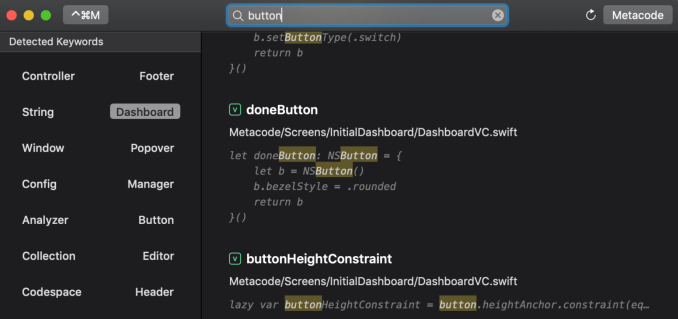
- Metacode: “Better code search,” currently for Swift, TypeScript and Javascript. Whereas many code environments only do plaintext search, Metacode sorts results by relevance, displays code in the context of code around it and allows you to filter results by keyword. The company says more than 700 engineers from companies like Pinterest and VueJS are currently using it. The cost is $25 per month per engineer.
- Fad Mania: This is an app that provides users with an endless stream of games with ambitions of being the next major social network. One of the first games was called Trump Punch, which got more than 100,000 organic users. The team realized most games don’t retain users and decided to create Fad Mania, which develops social-first games. Fad Mania has 1,000 weekly users.
- Breadfast: This startup delivers fresh bread, milk and eggs to customers in Egypt. Because Breadfast makes its own bread and works with farmers, its business has 35% gross margins with $180,000 in monthly revenue. For customers, Breadfast costs $18 per month per household.
- Ever Loved: If you thought people using GoFundMe’s to pay for their surgeries were dark, Ever Loved is helping people pay for funeral expenses with a dedicated platform. The crowdfunding site can help families and friends amass cash and the startup will let people pay for services directly from the site, letting them take a slice on both sides of the transaction.
- Localyze: Localyze provides international employee relocation as a service. Employee relocation is an expensive cost for businesses, yet every year, two million people are moving to the U.S. and Europe for work. Localyze wants to streamline that process with a software that automates some tasks related to immigration, moving and housing processes 50% faster. The platform also connects international employees to services like banking, insurance and transportation. Localyze is currently working with 27 B2B customers and says it produced $16,000 in revenue last month.
- Safely Deposit: This startup provides on-demand safe deposit boxes specifically for physical papers like estate documents and wills. You mail your documents in via FedEx, they store the physical copy in a safe deposit box while providing you access to digital copies. The cost is $120 per year.
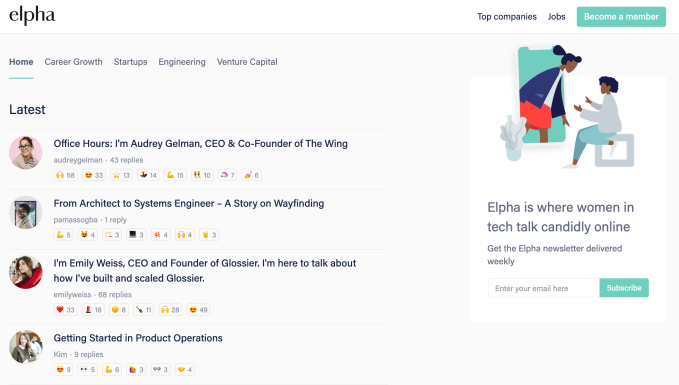
- Elpha: (IMAGE) This is a networking and communication platform for women in tech to talk candidly online. Elpha today counts 15,000 members and 6,000 members visiting the site each work. They have 23 paying companies who pay $12,000 per year for access to the platform. Elpha strives to be the first professional network built for and by women.
- Basis: This is a construction startup that automates workflows and manages bids from subcontractors. To date, Basis has four signed contracts within three weeks of operating. The big vision is to become a full-fledged platform for the construction industry.
- Hatchways: Learning to code online has kind of been a trope for people that are tired of their careers and are ready to do something new. The issue is that even if they get their skills to a great position that’s really only part of the equation. Hatchways is building a platform to help people who have learned to code online find internships and team projects. The startup is aiming to collect fees on both sides, from candidates looking to find opportunities and companies looking for new talent. They’re starting with software engineers but are also looking to expand into the finance space in the future.
- Puzzl: Puzzl is a campaign tracking platform for brands; it focuses on the in-person parts of campaigns. The platform lets businesses manage their ambassador programs and track metrics without being physically present at targeted locations. Puzzl’s software lets companies track impressions, engagement and conversions for the in-person parts of marketing campaigns. They managed a campaign for Juli Learning code school, another YC company. They’ve made $11,000 in revenue with 33% margins since launching 20 campaigns. Puzzl is currently enabling brands to manage 100 brand ambassadors in what it says is an $8 billion market.

- Marble Technologies: This startup provides cashier-free checkout kiosks for restaurants, running on iPads. Marble’s founders say their solution increases customer spending by 16%. They have three national restaurant chain contracts in the works, and have processed $3 million in sales to date. They charge $12,000 per location, per year.
- Apero Health: Led by a pair of serial entrepreneurs, including the former chief technology officer of Doctor on Demand, Apero Health provides automated claim submission, integrated online patient building and modern APIs to doctor’s offices.

- Short Story: You could think of Short Story as a Stitch Fix for petite women. Petite women can have a hard time finding clothes that fit them. First, petite women complete a style quiz to notify the company of their preferences. Then, Short Story sends them their first monthly box of clothes. Short Story says the petite women’s clothing market is worth $35 billion. To date, Short Story has seen 74% monthly revenue growth.
- EncepHeal Therapeutics: Non-addictive prescription substitutes have been a very popular solution for people addicted to drugs like tobacco and opioids. EncepHeal Therapeutics is creating medications to help the 2.5 million cocaine and methamphetamine addicts have a similar option. The company’s medication has shown promising early testing on lab rats.
- PopSQL: PopSQL provides collaborative SQL query editing. You can store SQL queries you run regularly, grouping them into folders that can be kept private or shared amongst your team. Version history tracks changes so it can be reverted if/when something breaks. It currently has more than 100 paying companies, and is making $13K per month. It plans to build a marketplace for apps that run on top of your company’s database.
- Kuarti: Kuarti is building the OYO of Latin America. The founder equates the current hotel booking process in Latin America to what it looked like decades ago in the U.S. Kuarti identified a trend of increasing demand to travel within Mexico’s growing middle class. However, there are currently no standardized hotel options in the country. Kuarti wants to provide another hotel booking option for standardized hotel chains that can be reserved online. The company wants to partner with independent hotels, to make small renovations and offer rooms for $35 per night. They’ve partnered with four hotels, have 20 rooms in their inventory and say that users have already booked 275 nights collectively. The founder identifies this as a $2.5 billion market in Mexico alone, and an $11 billion market across all of Latin America, where it hopes to expand.
- UpEquity: The startup lets future homeowners put down all-cash offers in what they claim is a $20 billion market opportunity. The founders, Harvard Business School dropouts, have a history in the private equity industry. The startup claims to have more than $30,000 in revenue for the month of August. The tech-enabled mortgage solution says it provides customers better bargaining power than traditional solutions, at competitive rates.
- Blair: Blair finances college education through income-share agreements. Through ISAs, which require students to pay back Blair a percentage of their future income, Blair finances everything from tuition to cost of living. Since launching a few weeks ago, Blair has already put $250,000 toward the education of 20 students. Blair will deploy its second fund this week.
- Intersect Labs: Intersect Labs is building CoreML for enterprise, letting its customers easily build machine learning models to help make sense of their historical data and deliver insights without having to hire data scientists. The monthly subscription is aiming to deliver a product that doesn’t require much technical knowledge. “If you can use a spreadsheet, you can use Intersect Labs.”
- Traces: As privacy-conscious consumers speak up against the proliferation of facial recognition tech, there’s still a clear need for a product that enables smart camera tracking for customers. Traces is building computer vision tracking tech that relies on cues other than facial structure like clothing and size to help customers integrate less invasive tracking tech. It was built by former Ring engineers.

- Epic Aerospace: Epic is manufacturing inexpensive space tugs to deliver satellites into geostationary orbit. The 21-year-old founder has been building rockets since he was 16, and is now managing a team of seven aerospace engineers with Epic Aerospace. The founder describes propulsion as one of the biggest problems for satellite companies, in that it can take up to two years to qualify new satellite systems and can cost up to $30 million. The problem they’re solving is moving satellites from low Earth orbit directly into geostationary orbit. Epic’s tug is half the cost of the competition and is reusable. They’re currently working with Satellogic, and chasing what the founder says is a $3.1 billion geostationary insertion market.
- Soteris: Soteris is a startup building machine learning software for insurance pricing. Within six months of their pilot, they already have two insurers under contract, giving them $500K in guaranteed annual revenue.
- Gold Fig Labs: The startup is building a tool for version control on settings pages. The founders come from Firebase, where they were both early employees. The company has signed up 60 companies in the last five weeks, including “multi-billion-dollar tech companies.”
- Mela: Mela, which refers to itself as the Pinduoduo for India, is an e-commerce platform that enables customers to participate in group shopping and buying via WhatsApp and Facebook. The number of orders on Mela are increasing by 59% per day.
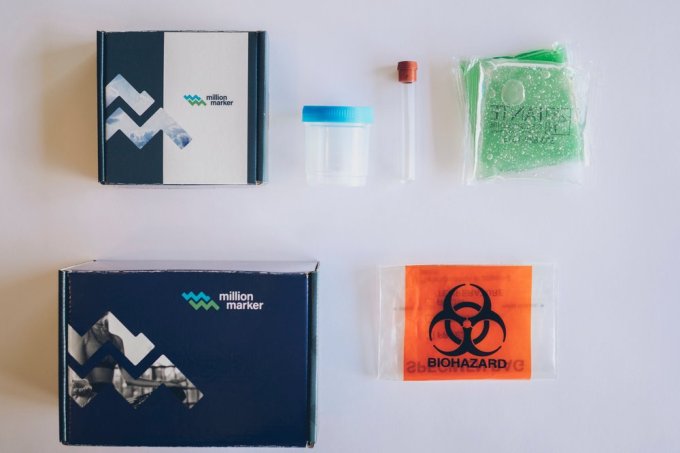
- Million Marker: The world is full of nasty chemicals that can mess up your body. Million Marker is building testing kits to help people measure their exposure to certain chemicals. The startup is starting with a urine testing kit that analyzes for BPA and Phthalates, plastics chemicals that can disrupt hormones and lead to fertility issues.
- Well Principled: This is an AI-driven management consultant that says it wants to “replace MBAs with software.” Companies spend $200 billion on management consultants every year. Well Principled wants to replace that expensive and cumbersome system with its tech that has culled growth and revenue learnings from academic research and turned it into enterprise software. The company wants to eliminate the need for outside consultants by integrating its software into the daily operations of businesses as they launch new products. Well Principled is advised and invested in by early Palantir leaders, and claims $840,000 ARR from its first Fortune 200 customer.
- Dashblock: Dashbloack creates APIs from any web page using machine learning. Drop in a URL, select the data you want from a page, and it will figure out how to automatically extract it and provide it via API. It has have more than 1,500 users since launching two weeks ago.
- Valiu: This startup provides remittances, or international money transfers, focused on the Latin American market. The company is beginning with a focus on Venezuela, where there are limited options for transferring money globally. The company estimates a $15 billion market and is currently growing 35% month over month.
- Vorticity: Vorticity builds custom chips to make computers 10,000x faster for fluid dynamics modeling. Vorticity’s chips and processes can be applied to industries like aerospace, life sciences and nuclear energy. Boom Supersonics, which spends millions of dollars every year on fluid dynamics work, is Vorticity’s first customer.
- PredictLeads: PredictLeads is aiming to help data-driven investors identify companies that are picking up traction. The startup says its data can tell you when the startups that you passed on are starting to gain traction, informing you when they’ve launched new products or are starting to advertise new partnerships.
- GreenTiger: Billing itself as the Robinhood for India, this startup is allowing users to trade U.S. stocks from India for ₹0 commission. As it is now, Indians don’t have Social Security numbers, preventing them to trade U.S. stocks. GreenTiger provides commission-free trades on NASDAQ and NYSE, and allows users to start trading in two minutes. GreenTiger provides fractional shares, allowing Indian traders to start trading with as little as ₹100. These ex-Microsoft founders describe the opportunity as worth $7.2 billion.
- Compound: Compound provides wealth management for startup employees, helping them figure out what their stock options actually mean, forecast their value over time and optimize against things like potential taxes. Launched two weeks ago, they currently have 200 startup employees as customers.
- Prenda: A startup that provides in-home “microschools” for K through 8th graders. Prenda provides everything a teacher needs to run a microschool, from glue sticks to curriculum. The startup claims microschools are the future of education.

- Curri: An Uber for construction supplies, Curri delivers construction-related materials, parts and tools on-demand. From refrigerators to small pipe fittings, Curri’s network of drivers can deliver it to your warehouse, job site or anywhere else you may need it for an average delivery of fee of $77. For three months in a row, Curri has grown 112% month over month.
- Nomad Rides: Nomad rides wants to compete with the big rideshare companies, but they also want to kill them. The commission-free rideshare program changes up the business equation by having drivers pay a monthly subscription to Nomad while collecting all of the ride profits. They are targeting college campuses first. In a two-month illegal trial period, the company facilitated 5,700 rides at Indiana University before the startup had to shut down, but they say they’re legal now and ready to try new markets.
- EARTH AI: This full stack AI-powered mining exploration company built a technology to predict the location of un-mined rare metals. EARTH AI’s mission is to improve the efficiency of mineral exploration to provide enough metals and minerals for current and future generations. The company predicts where metals may exist, actually mines the ore and then sells it. The team credits themselves with discovering the world’s first AI-predicted mineral deposit, and says it has also secured the rights to $18 billion worth of ore.
- Binks: Binks provides tailor-made clothing for women in India. The company says that the traditional method requires four-plus visits to a tailor; Binks, meanwhile, uses photos and computer vision to calculate fit and make clothing within three days.
- Lang API: A language translation platform that helps businesses translate the language on their website or app into any language in minutes, Lang says they are building the “AWS for translations” in what is a $20 billion market.
- Rent the Backyard: Imagine building and then renting out a studio apartment in your own backyard. Well, that’s what Rent the Backyard is all about. Rent the Backyard handles everything from the construction of the studio to selecting the tenant to occupy it. In exchange, the startup takes a 50% cut of the rent. So far, Rent the Backyard has 10 signed letters of intent from homeowners, with more than 1,200 people on its waitlist.

- Legacy: Legacy is a male fertility startup building a mail-in sperm testing product that helps people test their reproductive health without leaving their home. The company sells a kit that users can use and send back to them, at which point Legacy is able to analyze the sperm and let users know whether everything is in good working order.
- Lezzoo: Lezzoo wants to build the “super-app of the Middle East,” starting with an on-demand delivery service in Iraq. The company currently delivers food, beverages, groceries and pharmaceuticals to users in Iraq. The founder says they are seeing positive unit economics, including a net profit of 63 cents per delivery. The market is huge — 40 million people live in Iraq, but there is no digital infrastructure in place to serve the needs of an increasingly mobile population. The founder claims there’s a demand for mobile services like Lezzoo, citing that current users are placing two orders per month. Due to the lack of digital infrastructure in the country, Lezzoo is tasked with solving the problems of payments and mapping in addition to scaling its delivery network.
- Kern Systems: This startup wants to store information in DNA. “Google stores about 10,000 petabytes of data. You could store that in just the DNA in your thumb,” says company co-founder Henry Lee. The company says their first DNA storage synthesizer should be finished in nine months.

- Courier: After adding one line of code with Courier, developers can, first, send messages through every communication channel to users. Courier then measures users’ response rates on each channel (Slack, WhatsApp, Facebook Messenger etc.) and determines where notifications should be directed.
- Lokal: Lokal provides local news, information and classifieds for India. Since launching the app 10 months ago, Lokal has grown to 260,000 daily active users and is growing at 27% month over month. “The existing apps only focus on national and state level news,” the founder said. Otherwise, in order to get local news, they need to read a physical newspaper.
- taxProper: The company says that 60% of homeowners overpay on property taxes, so taxProper is building software that quickly allows customers to easily appeal their property taxes, helping them enter data about their home and determine if they are overpaying. The startup is charging $79 per appeal.
- InEvent: This is CRM for corporate events. It’s hard for businesses to create personalized, automated event experiences. This platform lets corporate event planners integrate registration, vendor and travel and expense management. InEvent is seeing $1.15 million ARR in Brazil, and broke into the U.S. corporate event market in May — which it describes as a $7.5 billion opportunity. They’re seeing $13,000 MRR in the U.S.

- Quirk: Quirk is a “thought diary” that helps to stop panic attacks by using the concepts of cognitive behavioral therapy. You identify negative thoughts you’re having, and then examine those thoughts to determine which parts are negatively impacting you. It costs $5.99 per month; the company says one month after launch, they have 1,000 paying customers.
- Zippi: Zippi provides loans specifically designed for gig workers in Brazil, a booming population underserved by traditional banks. The gig workers repay their loans with a percent of their income each week. Zippi is live and fully compliant. To date, they’ve done $160,000 in loans and plan to build and end-to-end neo bank for gig workers in Latin America.
- Simmer: Simmer provides reviews for individual dishes, not just for restaurants. Simmer tells you the best reviewed dishes across all delivery apps and services to help you better decide which food to order on-demand. In a one-month pilot there were 1,300 weekly active users on Simmer. This fall, Simmer will launch in three cities.
- Actiondesk: Updating spreadsheets is about as unsexy as enterprise workflows get, but Actiondesk is focusing wholly on revamping the data tables with “superpowers.” The company’s solution allows customers to dynamically connect data sources and their spreadsheets so that edits made in the spreadsheet will be replicated in the data source. Users are also able to schedule actions related to the data in their sheets.
- GradJoy: GradJoy is a fintech platform that wants to help recent grads better-strategize their student loan payments. The company bills itself as “a student loan co-pilot,” and a “robo-advisor for student debt,” offering services meant to help users save money. GradJoy connects loans and financial information to create personalized repayment plans for new borrowers. They’ve completed eight refinances in two weeks, and have amassed more than 1,000 customers within a few weeks of being operative. GradJoy doesn’t want to stop at student debt, but scale out to provide services for other types of debt repayment in the future.
- Taskade: This is a collaboration tool for remote teams. You can create lists, outlines and mindmaps, then collaborate and chat about them in real-time. It currently has more than 700 active teams, and over 10,000 active users.
- Alana: Alana helps large businesses headquartered in Latin America hire and retain blue-collar workers. Their hope is to become the LinkedIn of the blue-collar industry with a better matching process for potential employees and by automating much of the process. The company claims to have experienced very fast growth, working with companies like Hilton, Starbucks and Rappi. They charge a monthly subscription per store or $400 in MRR per location.

- Obie: This is a free analytics platform for commercial real estate owners to manage their assets. From there, Obie uses that data to sell insurance to those commercial real estate owners. In the last year, Obie has done $1.4 million in gross premiums.
- Together Software: Together is building souped-up employee mentorship software that helps new employees get connected with veterans inside their company. The onboarding buddy program handles pairing of employees and can help the duos schedule meetings and work their way through development plans.
- Holy Grail: Holy Grail says it has built a cheaper and faster way to manufacture batteries. The company is using AI to find the next generation of batteries at what it claims is 1,000x faster and hundreds of million dollars cheaper than traditional R&D processes. Holy Grail’s software designs batteries and predicts their performance — then manufactures them using a robot it built. Traditional R&D relies on trial and error and spreadsheets, and this company thinks it can harness AI to “do something good for the world while also making money.”
- Tranqui Finanzas: This startup provides consumer debt consolidation for Latin America, where 45 million employees have existing high interest loans. Payments are made through salary deductions. After launching seven weeks ago, they’re making $6K monthly net revenue.
- Sorting Robotics: It began its life building a robot sorting Magic: The Gathering cards. Now it’s pivoting to sorting weed. They buy cannabis trim for $120 per lb; their robot separates the sticks/leaves from the flower, which can be resold for upwards of $180 per lb. Four weeks after rolling out their first robot, it’s making roughly $1,000 per day.
- Pengram: Augmented reality is making itself useful through Pengram’s indoor navigation system. Pengram enables anyone to create indoor pathways using any iOS device and then easily share those pathways with others. Already, Pengram has a $10,000 pilot with building maintenance company Johnson Controls, which uses the tool to quickly located sprinklers, smoke detectors, fire extinguishers and other systems they need to find and ensure are properly up to date and working.
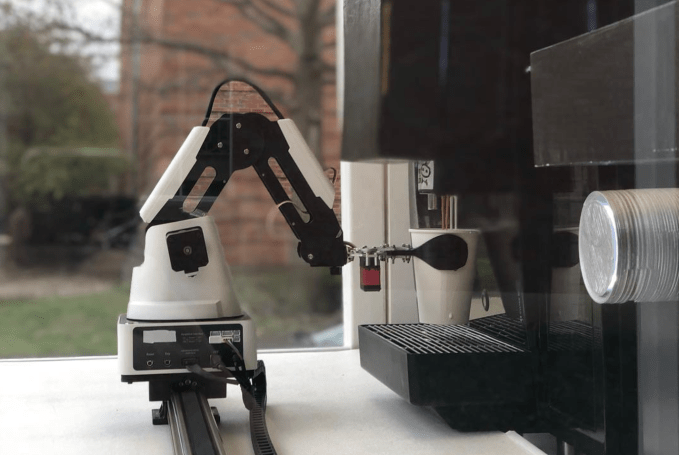
- Yummy Future: Yummy Future is basically a robotic Starbucks. The company wants to take baristas out of the coffee-making process, using a box of robots to make complex espresso drinks. It’s not the only one in this space, but the startup is hoping that partnerships with existing marketplace retailers will be the key to its success.
- Athlane: Athlane is building what it calls “the NCAA for esports,” a new esports league powered by its software. The founders believe they have what it takes to help college esports eclipse traditional sports, citing that the League of Legends finals saw 5X the viewership of the NBA finals in 2019. Athlane hopes college esports teams will compete on their platform because they’ll actually be able to pay their players. Athlane will enable teams to monetize through its AI-powered sponsorship platform, and has secured two contracts with G Fuel and DraftKings.
- TRM Labs: Banks are required to trace the source of their customers’ money. TRM helps banks identify and trace cryptocurrency fraud. They charge $20K per user seat. Though they couldn’t say the name, TRM says they recently signed a top-five global bank as a customer.
- Mars Auto: The startup is developing autonomous trucks for the $50 billion Korean trucking market. The goal is to fully automate warehouse to warehouse truck operations to save the trucking market billions. The company has two LOIs with two of the largest logistic businesses in Korea.
- Wasmer: Wasmer is an application container that works in edge computing. Powered by WebAssembly, Wasmer is building the next generation of containers that enables developers to run any code on any client.
- Matagora: Matagora is delivering pop-up physical storefronts for online brands. The startup is partnering with local businesses to fill areas of their store with online-only gear that brands are looking to get in front of people’s eyeballs. Matagora takes a whopping 40% of each sale.

- Nonu: Nonu calls itself the “Hims for India.” The company created a subscription hair loss prevention kit that includes medicines, vitamins and herbal shampoo. The founder says that 80% of Indian men don’t know that prescription medicine can stop hair loss in India, and therefore are getting scammed into spending over a billion dollars on fake hair loss products while continuing to lose hair. With Nonu, all you have to do is take a photo of your balding head, and you’ll receive a monthly subscription of medicine that will show up at your door. Nonu says that within this $7.2 billion market, there are 60 million hair loss patients who can afford this $120 a year subscription in India. Nonu has already amassed 500 subscribers, and plans to expand into tackling sexual wellness.
- Dex: Dex is a personal CRM. You sync up your contacts/calendars, and it finds the people you haven’t kept in touch with and reminds you to reach out. You can add notes about a contact — like what you last spoke about, or what’s going on in their life — to help with the conversation next time you see them.
- Outtalent: This startup helps engineers living in emerging markets get jobs abroad. The company was launched by a pair of brothers from Kyrgyzstan, one of which landed a life-changing job at Google years ago and wants to make the entire process easier for other foreigners.
- SannTek Labs: SannTek created a breathalyzer that detects cannabis consumption, as well as alcohol consumption. The founders say there’s currently no breathalyzer for cannabis because it’s a technically challenging task. SannTek has developed sensors that can detect whether you’ve consumed cannabis in the last three hours. Once it launches, it will charge police officers $20 per test.
- BuildStream: The startup is a platform for companies to manage and optimize rented equipment fleets. The team is focusing specifically on the construction industry, trying to minimize idle equipment. Users start by installing off-the-shelf IoT sensors on gear to track the fleet of equipment and pinpoint areas for optimization.
- Sling Health: Sling Health wants to build more cost-effective virtual care teams. The ex-Forward founders say they want to turn any doctors office into a One Medical model. Next-gen tools can’t scale their engineering teams. Sling’s platform automates back offices with remote medical teams and 24/7 chat support. Sling Health says it has already transformed 12 doctor’s offices and is producing over $17,000 in monthly recurring revenue. The founders say they can save doctors 67% on labor costs while also drastically improving patient experiences with a personalized care team. The tech can apparently manage scheduling, create personalized follow-ups and manage prescriptions.

- MoFE: The “Museum of Future Experiences” turns physical spaces into trippy, walk-around virtual reality experiences. They launched in New York three weeks ago, and have sold every ticket available so far to bring in $60K in revenue since launch.
That’s all for Day 1, we’ll be posting our favorites from today’s batch soon and we’ll be back tomorrow with the rest of the batch.
Update: Here are Day 2’s startups
Here are the 82 startups from day 2 of Y Combinator’s S19 Demo Days































Comment